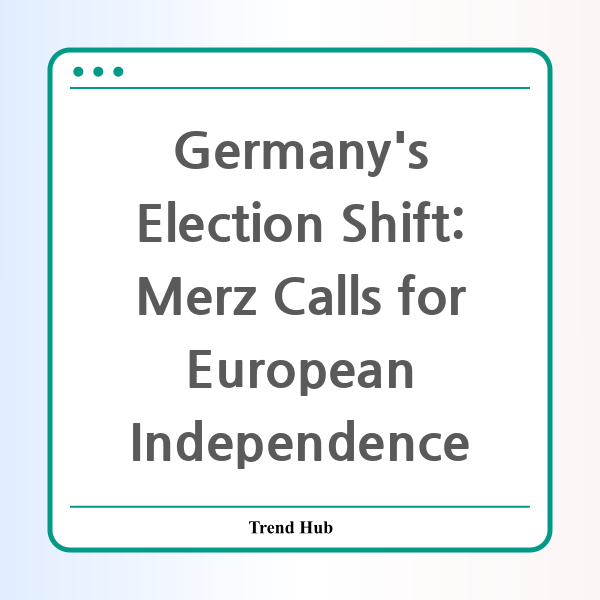* This website participates in the Amazon Affiliate Program and earns from qualifying purchases.

In a historic election outcome, Germany's conservative party led by Friedrich Merz has emerged victorious, marking a pivotal shift in the country's political landscape. As the leader of the Christian Democratic Union (CDU), Merz secured 28.6% of the votes, setting the stage for him to likely become Germany’s next chancellor. This election also witnessed a significant surge in support for the far-right Alternative for Germany (AfD), which has raised eyebrows and concerns throughout Europe.
Merz, an experienced political figure but a newcomer to the chancellorship, has made headlines with his call for Europe to seek greater independence from the United States. He articulated this sentiment emphatically, stating that Europe must strengthen itself to stand apart from U.S. influences, which he views as excessive and intrusive. \"The interventions from Washington were no less dramatic and drastic and ultimately outrageous than the interventions we have seen from Moscow,\" Merz asserted, demonstrating his commitment to fostering a more autonomous Europe.
As he prepares to form a coalition government, Merz faces the daunting challenge of addressing two pressing issues: the rise of the AfD and the overall direction of German policies amidst a flagging economy. The AfD garnered 20.8% of the vote, making it the second-largest party in parliament, causing unease among those who remember the country’s complicated history with far-right ideologies.
Voter turnout for the election was notably high at 82.5%, indicating a strong public interest in the outcome amid rising concerns over immigration and political stability tied to the U.S. elections. Before the election, Merz criticized the alleged interference from U.S. figures, notably mentioning Elon Musk, who has been accused of supporting far-right agendas. Merz's claims reflect a growing trend among European leaders who are wary of external influences shaping their domestic political landscapes.
The result of this election represents more than just a shift in political power; it signifies a deeper yearning for change among German voters. With the CDU’s win, there could be significant policy shifts regarding immigration, economic strategies, and Germany’s role within the European Union. However, the exclusion of the AfD from coalition talks reflects an ongoing resistance among traditional parties to align with far-right movements.
As Friedrich Merz prepares to navigate coalition negotiations and potentially take over as chancellor, the stakes are high. He must balance between appeasing a divided electorate and maintaining the integrity of Germany's political foundation. The CDU has a fundamental responsibility to ensure that the rise of the AfD does not erode the democratic principles that post-war Germany was built upon.
The upcoming months will be crucial as Merz determines how to lead Germany forward while upholding the values of unity and cooperation within Europe. The call for independence from U.S. influence could reshape not only German politics but also set a precedent for other European nations grappling with similar dilemmas as they navigate their own political futures.
* This website participates in the Amazon Affiliate Program and earns from qualifying purchases.